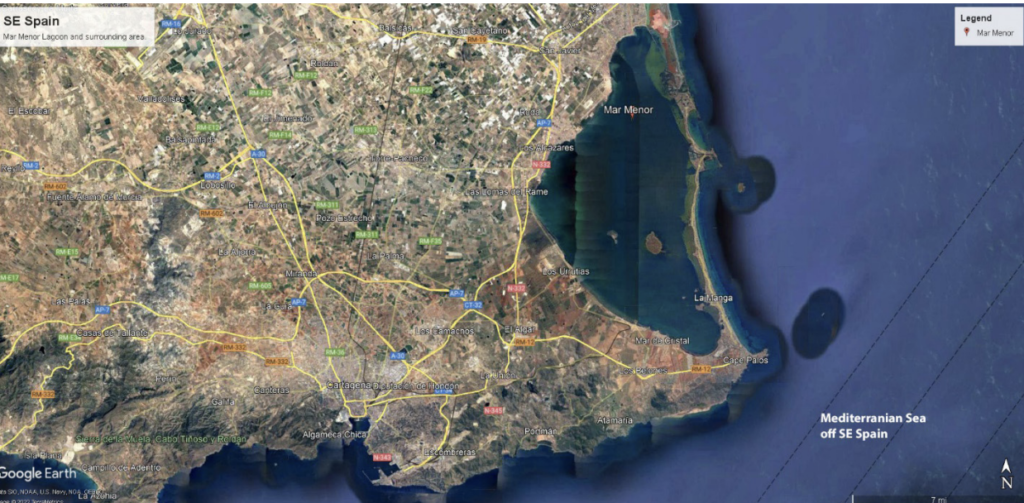
In Southeastern Spain on the Mediterranean Sea, near the city of Cartagena, a narrow 22 km long sandbar encircles a shallow lagoon, a saltwater marsh known as Mar Menor meaning ‘Little Sea’. Sometimes nicknamed ‘Paradise Lagoon’ it is home to valuable, rare and endemic species and ecosystems. In the last decade the culmination of intensive agriculture, land development and population growth have led to rapid eutrophication.
In the summer of 2021 millions of dead fish washed up on the hotel studded shores of the lagoon. The double-tap of concentrated hard surfaces and agricultural run-off were blamed for this event. Similar events also occurred in 2016 and 2019 establishing a new and unacceptable normal. A 600,000-citizen push for action to protect the lagoon has resulted in a new initiative and a landmark law. Spain’s senate codified the lagoon’s right to ‘personhood’, the first such ‘Rights of Nature’ measure in Europe. OWA’s Summer ’22 Wetland Trumpeter newsletter’s article on Pachamama describes how this ‘personhood’ notion boldly enshrined in Ecuador’s constitution is taking hold in other nations of the world. The Spanish law codifies Mar Menor’s ‘right to exist as an ecosystem and to evolve naturally’. It recognizes its right to protection, conservation and restoration.
The Spanish government has committed 382 million Euros to the regeneration of the lagoon. Groups of caretakers including local officials, scientists and residents are charged with developing a first ever Mar Menor management plan, a concept that had previously never been considered. Chief among the management decisions will be to reduce the influx of agricultural nutrients that are estimated to be about 5 metric tons a day.
Hundreds of sanctions against farming interests have already been imposed. Other management initiatives will be the creation of strategic buffer zones around critical aquatic ecological areas that will support fish spawning and waterfowl habitat. They will also create a long-term vision that takes into consideration coastal dynamics, climate change and sea level rise. They will establish inclusive governance models with environmental NGOs to balance commercial interests.
Strategic land purchases will reduce development pressure and increase public access to natural features. Research will inform science-based restoration. The effectiveness of the conservation also depends on the establishment of strong institutions, which take agreed upon measures. Successful management and respect for natural ‘personhood’ of nature includes well organized cooperation of different institutions involved in nature conservation, evidence-based information on biodiversity and natural process, and appropriate socioeconomic indicators with the courage to establish innovative long-term solutions.
The legal implications for a law that establishes ‘Rights of Nature’ enable a citizen to advocate for nature with ‘legal standing’, a hurdle that normally prevents most individuals from acting without showing personal harm. Some activists are asking for even more power to speak up for nature urging a charter on international law against the crime of ‘ecocide’. Their goal is to create legal structures that globally address all cases of serious, extensive, or longterm damage to the environment. Essentially, it would become illegal to harm the natural environment that sustains us and supports all life on the planet. With a human population of 8 billion people and soaring, it’s time to consider Pachamama.